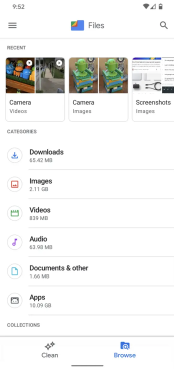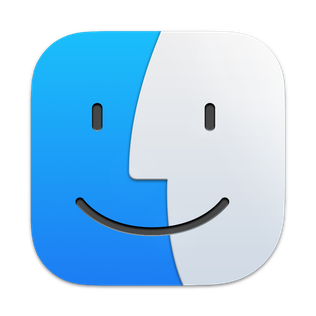
The Finder is the default file manager and graphical user interface shell used on all Macintosh operating systems. Described in its "About" window as "The Macintosh Desktop Experience", it is responsible for the launching of other applications, and for the overall user management of files, disks, and network volumes. It was introduced with the first Macintosh computer, and also exists as part of GS/OS on the Apple IIGS. It was rewritten completely with the release of Mac OS X in 2001.
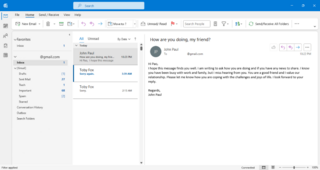
Microsoft Outlook is a personal information manager software system from Microsoft, available as a part of the Microsoft 365 software suites. Though primarily being popular as an email client for businesses, Outlook also includes functions such as calendaring, task managing, contact managing, note-taking, journal logging, web browsing, and RSS news aggregation.

File Explorer, previously known as Windows Explorer, is a file manager application and default desktop environment that is included with releases of the Microsoft Windows operating system from Windows 95 onwards. It provides a graphical user interface for accessing the file systems, as well as user interface elements such as the taskbar and desktop.

Maxthon is a freeware web browser, created by JeffChen in Singapore. It is available for Windows, macOS, Linux, and as Maxthon Mobile for Android, iOS, and Windows Phone 8. Since version 6, Maxthon is based on Chromium.

Gmail is an email service provided by Google. As of 2019, it had 1.5 billion active users worldwide, making it the largest email service in the world. It also provides a webmail interface, accessible through a web browser, and is also accessible through the official mobile application. Google also supports the use of third-party email clients via the POP and IMAP protocols.

Microsoft OneDrive is a file hosting service operated by Microsoft. First released in August 2007, it allows registered users to store, share and sync their files. OneDrive also works as the storage backend of the web version of Microsoft 365 / Office. OneDrive offers 5 GB of storage space free of charge, with 100 GB, 1 TB, and 6 TB storage options available either separately or with Microsoft 365 subscriptions.

MediaFire is a file hosting, file synchronization, and cloud storage service based in Shenandoah, Texas, United States. Founded in June 2006 by Derek Labian and Tom Langridge, the company provides client software for Microsoft Windows, macOS, Linux, Android, iOS, BlackBerry 10, and web browsers. MediaFire has 43 million registered users and attracted 1.3 billion unique visitors to its domains in 2012.

Google Chrome is a web browser developed by Google. It was first released in 2008 for Microsoft Windows, built with free software components from Apple WebKit and Mozilla Firefox. Versions were later released for Linux, macOS, iOS, and also for Android, where it is the default browser. The browser is also the main component of ChromeOS, where it serves as the platform for web applications.
This is a comparison of online backup services.
Web storage, sometimes known as DOM storage, is a standard JavaScript API provided by web browsers. It enables websites to store persistent data on users' devices similar to cookies, but with much larger capacity and no information sent in HTTP headers. There are two main web storage types: local storage and session storage, behaving similarly to persistent cookies and session cookies respectively. Web Storage is standardized by the World Wide Web Consortium (W3C) and WHATWG, and is supported by all major browsers.
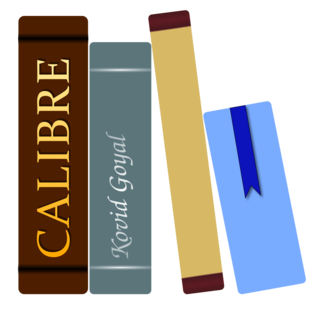
Calibre is a cross-platform free and open-source suite of e-book software. Calibre supports organizing existing e-books into virtual libraries, displaying, editing, creating and converting e-books, as well as syncing e-books with a variety of e-readers. Editing books is supported for EPUB and AZW3 formats. Books in other formats like MOBI must first be converted to those formats, if they are to be edited. Calibre also has a large collection of community contributed plugins.
Google Drive is a file storage and synchronization service developed by Google. Launched on April 24, 2012, Google Drive allows users to store files in the cloud, synchronize files across devices, and share files. In addition to a web interface, Google Drive offers apps with offline capabilities for Windows and macOS computers, and Android and iOS smartphones and tablets. Google Drive encompasses Google Docs, Google Sheets, and Google Slides, which are a part of the Google Docs Editors office suite that permits collaborative editing of documents, spreadsheets, presentations, drawings, forms, and more. Files created and edited through the Google Docs suite are saved in Google Drive.

Android Ice Cream Sandwich is the fourth major version of the Android mobile operating system developed by Google. Unveiled on October 19, 2011, Android 4.0 builds upon the significant changes made by the tablet-only release Android Honeycomb, in an effort to create a unified platform for both smartphones and tablets. The first phone with Android Ice Cream Sandwich was Samsung Galaxy Nexus.
This is a comparison of mobile operating systems. Only the latest versions are shown in the table below, even though older versions may still be marketed.
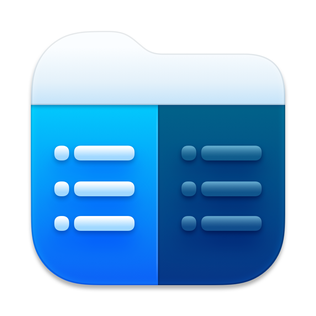
Commander One is a dual-pane file manager designed for macOS. Developed by Electronic Team, Inc. the app is created entirely in Swift and aims to provide users with a powerful and intuitive tool to navigate, manage, and manipulate files and folders on their Mac computers. The application offers a wide range of features and meets the requirements of both casual users and professionals.

A progressive web application (PWA), or progressive web app, is a type of application software delivered through the web, built using common web technologies including HTML, CSS, JavaScript, and WebAssembly. It is intended to work on any platform with a standards-compliant browser, including desktop and mobile devices.
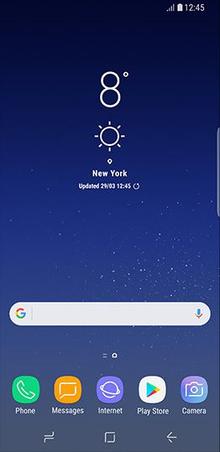
Samsung Experience is a discontinued software overlay for the Android "launcher" by Samsung for its Galaxy devices running Android 7.x “Nougat” and Android 8.x “Oreo”. It was introduced in late 2016 on a beta build based on Android 7.0 “Nougat” for the Galaxy S7, succeeding TouchWiz. It has been succeeded in 2018 by One UI based on Android 9 “Pie” and later versions.
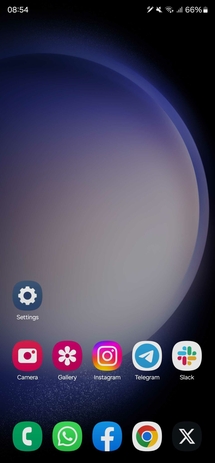
One UI is a user interface (UI) developed by Samsung Electronics for its Android devices running Android 9 "Pie" and later. Succeeding Samsung Experience and TouchWiz, it is designed to make using larger smartphones easier and be more visually appealing. To provide more clarity, some elements of the UI are tweaked to match colors that are based on the color of the user's phone. It was announced at Samsung Developer Conference in 2018, and was unveiled in Galaxy Unpacked in February 2019 alongside the Galaxy S10 series, Galaxy Buds and the Galaxy Fold.
ES File Explorer is a file manager/explorer designed by ES Global, a subsidiary of DO Global, for Android devices. It includes features like cloud storage integration, file transfer from Android to Windows via FTP or LAN, and a root browser. It was removed from the Google Play Store for committing click fraud.
